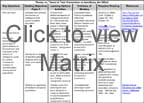Weekly Objectives
In this week you will...
- become familiar with the characteristics of an effective teacher of the gifted.
- examine ideas for making your classroom a comfortable and nurturing learning environment.
Characteristics of an Effective Teacher of the Gifted
We have reached week 8! You have developed an understanding of the nature and needs of gifted students, how to identify them, develop a program to meet their needs, how to advocate for support to continue existing programs – now you are going to learn about your role and what makes you so special and necessary – the teacher of the gifted!
The first question and/or possible myth that comes into mind is – must a teacher of the gifted be gifted? We could answer that question with another question that brings us right back to the beginning of the course – what is the definition of gifted? Rather than discuss which came first – the chicken or the egg, let’s borrow a quote from Clark’s book, “The teacher . . . gives not of his wisdom but rather of his faith and his lovingness. If he is indeed wise he does not bid you enter the house of his wisdom, but rather leads you to the threshold of your own mind.” (Gibran, 1960, p.62).
It Takes More Than a Teaching Degree
The truth is, teachers of the gifted do not have to be gifted, but they should possess certain qualities. In her book, Teaching Gifted Kids in the Regular Classroom, p. 193, Susan Winebrenner lists the following:
- Enthusiasm about teaching and the joy of lifelong learning. Gifted students are very perceptive, they will know if you are honestly excited about what you are doing and whether you practice what you teach when you encourage them to research and explore.
- Flexible teaching style. You have to be prepared to work with diverse learning styles – you cannot always lecture, you have to moderate, perform, facilitate – go with the flow!
- Strong listening skills. Your students have a lot to say – many are very well-read and knowledgeable beyond their years – listen with respect and acknowledge their intelligence.
- Knowledgeable about the unique characteristics and needs of gifted students and willing to accommodate them. Understand the need to move, explore, fly ahead, verbalize – know your underachievers and perfectionists. Once you are aware, customize your program to accommodate and personalize your delivery to meet the unique needs of your students.
of the gifted
be gifted?
- Able and willing to set up and nurture a learning environment in which risk-taking and mistake-making are expected and encouraged. It’s ok to make mistakes – point out the errors of your ways when they occur. The line, “I did that on purpose to see if you were paying attention,” works for a very short time. Many of your gifted students are used to getting everything right – they don’t make mistakes. When they are challenged they tend to shut down, not answer, and not participate because they do not want to make a mistake. You must strive to develop an environment where mistakes are considered to be learning experiences – tools to progress!
- Respectful of students’ strengths and weaknesses. Creative grouping and developing activities incorporating the multiple intelligences provides students outlets to demonstrate mastery using their strengths and encourages students to stretch and step out of their comfort zones more readily to try developing products in areas of lesser strength.
- Willing and eager to expose students to new ideas and provide opportunities for exploring those ideas. Provide multiple and diverse resources. Invite guests to share experiences, take actual or virtual field trips, teach through providing open ended or driving questions – encourage them to find the path to the truth!
- Well-developed sense of humor about themselves and their students. “Laughter is the best medicine.” Gifted students have a unique sense of humor – they see things from a totally different perspective. They must understand that it is OK to laugh at oneself – the best way to accomplish this is to model. Share situations where you did something ridiculous and let them see that you survived as you all laugh together about the incident.
- Able and willing to connect curriculum to students’ learning styles, interests, and questions. Develop lessons that connect to real world situations, incorporate the multiple intelligences as you provide choice menus for products demonstrating mastery, ask open ended questions that have no right or wrong answers – just require that students support their responses with facts.
- Well-organized though not necessarily “neat." Encourage students to develop their own system of organization - something that works for them, but is not scattered all over the classroom. Remind them that we all function differently, but we must maintain a semblance of organization to keep our belongings and work easily accessible and neat.

